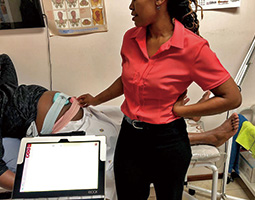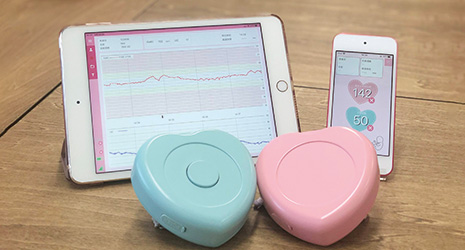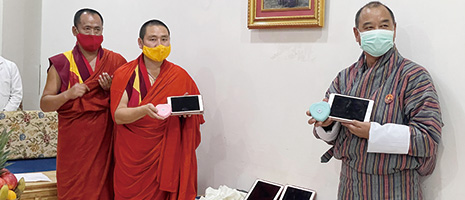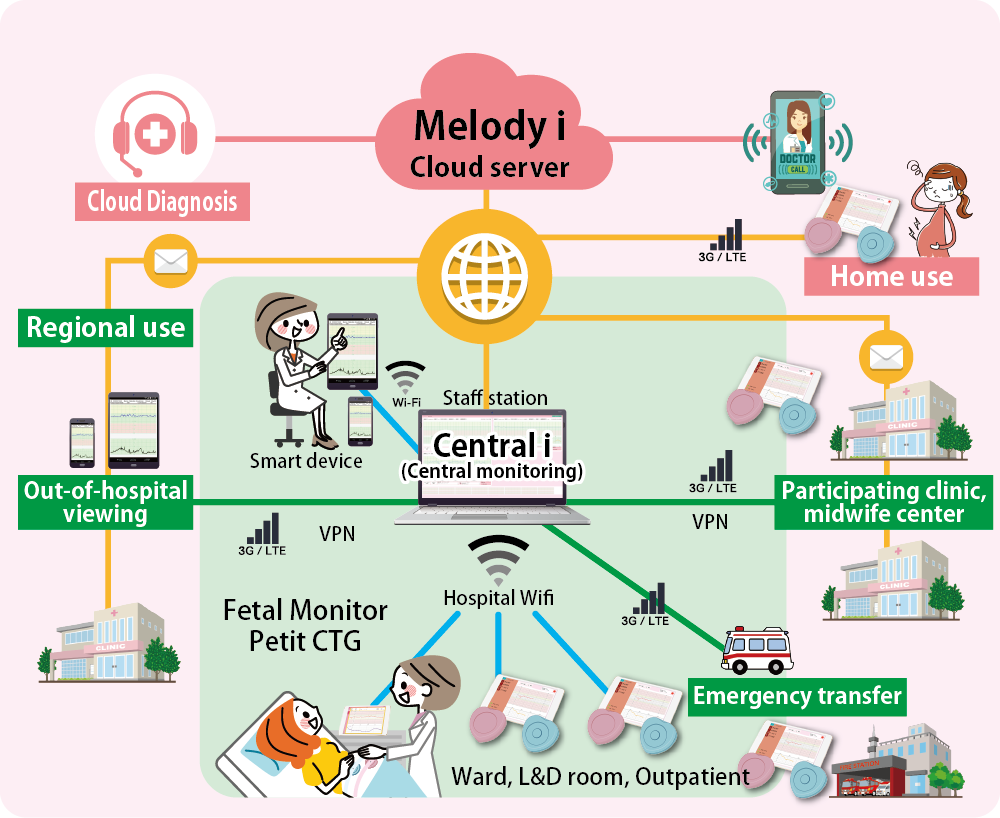INDEX

A pregnant woman wearing a “Mobile Fetal Monitor iCTG” in a demonstration in the Republic of South Africa
September 2021
Spreading the Use of an Online Screening System for Expectant Women to the World

Use of an online screening system to help women give birth safely is spreading in Japan and overseas.

An online antenatal health screening system has been developed that allows expectant women to listen to the heartbeat of their unborn child by themselves and to have the condition of the fetus checked by a doctor remotely, simply by attaching a palm-sized sensor to the abdomen.
At the core of the system is the “Mobile Fetal Monitor iCTG,” an IoT-based fetal monitor consisting of two heart-shaped sensors, one pink, one blue. The pink sensor measures the heartbeat of the fetus in the woman’s body, while the blue sensor measures the interval and intensity of the woman’s contractions. Both are controlled by a tablet connected via bluetooth. The data measured by the sensors are transmitted in real time to a doctor located remotely via the perinatal e-Health platform “Melody i.” The data can also be sent to a central hospital that has an NICU (Neonatal Intensive Care Unit).
The system was developed by Melody International Ltd., founded in 2015 and based in Takamatsu City, Kagawa Prefecture. Company CEO Ogata Yhuko explains what led to the development of the system.
“In Japan, women are becoming mothers at a later age, so the ratio of pregnant women at risk of experiencing complications in their pregnancy is on the rise. At the same time, the number of medical institutions with childbirth facilities has fallen by over 20 percent during the past decade, and in particular there is a severe shortage of obstetricians in rural areas. Women there sometimes have to drive more than two hours on mountain roads to get to the hospital for a check-up. Monitoring of the condition of the mother and fetus by a doctor in real time alleviates the burden of hospital visits. And if an abnormality is detected, the patient can quickly ask the doctor for a medical assessment and treatment,” she says.

The path to development of the system involved various difficulties.
The fetal heart monitor used in hospitals is about the size of a household printer, and the sensor and body are separate. Ogata managed to fit the sensor into a palm-sized box without sacrificing any aspect of its functionality by such means as building the speaker into the sensor. However, this built-in speaker creates interference between the sound of the heartbeat and the sound from the speaker, which made noise cancellation a challenge.
Says Ogata, “It was a long process of trial and error to extract clear and accurate heart rate data out of a complex signal mixed with noise.” The integrated sensor and speaker allow the woman to attach the sensor herself by locating the fetus intuitively as she listens to the heartbeat. “We couldn’t give up on this integrated system,” says Ogata.
2019 saw the full-scale launch of the system into the Japanese market, and its use in university hospitals and other healthcare settings across the country has expanded rapidly as the spread of COVID-19 accelerates the need for the technology.
Japan is not alone in facing the challenge of securing a stable supply of obstetricians and strengthening perinatal care services. In 2016, the Mobile Fetal Monitor iCTG was provided to Chiang Mai, Kingdom of Thailand, under a Japan International Cooperation Agency (JICA) project, and in November 2020 was provided to the Kingdom of Bhutan with support from JICA and the United Nations Development Programme (UNDP).
“I’m hoping that this system will come to be used more widely to provide security and peace of mind in childbirth for all expectant mothers around the world,” says Ogata.
Feedback from users has been positive, with some reporting less stress due to the reduced financial and time burden of hospital visits, while others say that hearing the fetal heartbeat firsthand has helped the father and siblings develop a bond with the baby even before it is born.
Commenting on her strong ambitions for the future of the system, Ogata says, “Our aim is to lower the cost through mass production, make it even smaller and aim towards creating a telemedicine platform for expectant women. In particular, we are committed to using our technology to help strengthen healthcare systems in developing countries where there is a shortage of medical specialists.”


